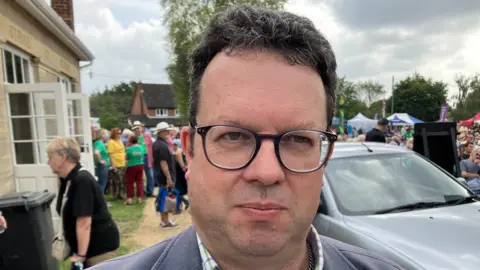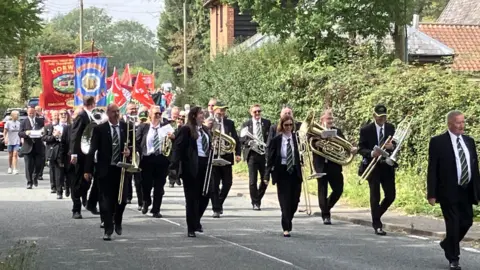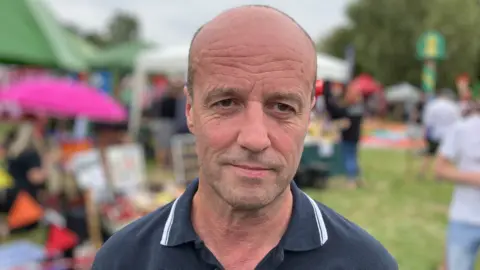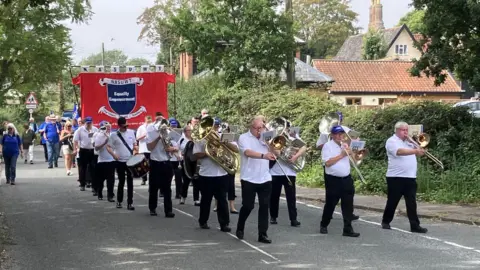Burston strike school rally: Unions pledge to continue industrial action
 Andrew Sinclair/BBC
Andrew Sinclair/BBCTrade union leaders in the East of England say they will continue with industrial action even though some disputes are more than a year old.
The mood at the annual gathering of trade unionists at Burston, Norfolk, was one of defiance, despite the disruption and loss of pay.
Nigel Mason, from the British Medical Association (BMA), said: "We are not going anywhere."
"We are prepared to continue... for as long as it takes."
Telling the crowd that junior doctors had just voted for further action he added: "If Rishi Sunak does not come to the table with a credible offer on pay he will face another six months of action, and another six months after that and after that another six months."
 Andrew Sinclair/BBC
Andrew Sinclair/BBCThe annual Burston Strike School Rally, which attracted hundreds of activists from across the region, commemorates the longest strike in history which was started by pupils at the village school in 1914 in protest at the dismissal of their teachers Tom and Kitty Higdon, and it lasted for more than 25 years.
Many of those who took part in the march around the village on Sunday are involved in disputes which show no sign of being resolved.
 Andrew Sinclair/BBC
Andrew Sinclair/BBCRoger Gibson, district organiser for train drivers union ASLEF, said support among members for further strike action was growing.
"We've now had three ballots for industrial action on Greater Anglia and we're getting 90% plus in favour of action," he said.
"I believe it will be another year of industrial unrest particularly in the rail industry.
"Our members are up for the fight, we want to defend our terms and conditions of service."
 Andrew Sinclair/BBC
Andrew Sinclair/BBCDr Mark Walmsley, from the University of East Anglia branch of the University and College Union, which has been involved in several disputes over the last few years, said it was "not asking for massive pay increases".
"The vast majority of pay increases that are being demanded of unions wouldn't even bring us back in line with the amount we were being paid back in 2009," he said.
According to the Office for National Statistics, last year the UK recorded the highest number of working days lost to industrial disputes for more than 30 years.
 Andrew Sinclair/BBC
Andrew Sinclair/BBCSome unions, like those representing postal workers, nurses and teachers have settled, but the deputy general secretary of the National Education Union, Niamh Sweeney, warned there were still issues around workload and teacher assessment that needed resolving.
"Our teachers are passionate about delivering the best education for the children they work with," she said.
"They get very disgruntled very quickly when they're taken advantage of."
 Andrew Sinclair/BBC
Andrew Sinclair/BBCThe unions blame the government for blocking meaningful negotiations with employers, while the government has frequently said it wants to see an end to industrial action but always adds that public money is limited and any pay rises must go hand in hand with efficiencies and changes to working conditions.
There was a feeling among some at Burston that many of these disputes may not be settled this side of the general election which is expected sometime next year and that in many industries many more months of disruption lie ahead.

Follow East of England news on Facebook, Instagram and Twitter. Got a story? Email eastofenglandnews@bbc.co.uk or WhatsApp us on 0800 169 1830